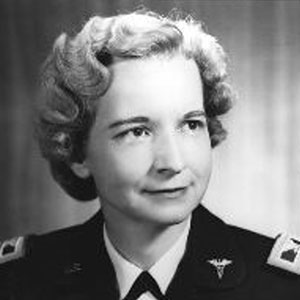Irene Clark Woodman

(1905 – 1994)
Colonel Irene Clark Woodman spent 30 years as an officer in the Army Nurse Corps and during her career changed the status of men and women who served in professional nursing on the Army Medical Team.
A native of Clarkton, N.C., Irene Clark Woodman was commissioned a 2nd Lieutenant in 1938 and attained the rank of Colonel through increasing assignments of responsibility before retiring. Only five Army Nurses could be in the rank of Colonel by law in this period of history.
Colonel Clark was on duty in the Territory of Hawaii on 7 December 1941 when the Japanese attacked the military bases at Pearl Harbor. She served as Chief Nurse, 24th Corps in South Korea, and later was the only woman staff officer assigned to General Douglas MacArthur’s headquarters of the Far East when the Korean War started 25 June 1950.
In 1956, while assigned as Director of Nurses and Medical Specialists programs in the Office of the Surgeon General, she designed and implemented the Army Student Nurse Program. The program was the first scholarship program to assist students enrolled in civilian colleges and universities to complete their undergraduate programs in nursing education. Student participation incurred an obligation of two or three years’ service on active duty as officers in the Army Nurse Corps after licensure.
Appointed Chief Army Nurse in 1963, Irene initiated important changes during her four-year tour. Some notable ones were: implementing tropical women’s field clothing, initiating action for men to be commissioned in the Regular Army Nurse Corps, initiating projects for improved standards for nursing care and service, improving promotion opportunities for officers, and initiating changes to codes and laws that removed limitations on promotions of army nurses. She was the last Chief who served in the grade of Colonel. All Chiefs of the Corps since then have been promoted to the rank of Brigadier General.
Irene has been the recipient of many honors for outstanding and meritorious service to include the Army Commendation Medal with Pendant, the Distinguished Service Medal (our nation’s highest award for service in positions of great responsibility.) It is the first time this award was presented since World War II to an Army Nurse. During the buildup of the Vietnam War, Irene initiated policies for improved career opportunities, housing, and morale of Medical officers and enlisted personnel alike.
In 1981 Governor William Milliken appointed her to the seven-member Board of Managers, and the Michigan Veteran Facilities in Marquette and Grand Rapids, Michigan.
Throughout her military career, and since, she has been guided by her faith in the worth of the individual, her selfless devotion to her profession, and the improvement of care to the soldier and his family in times of war and peace.





